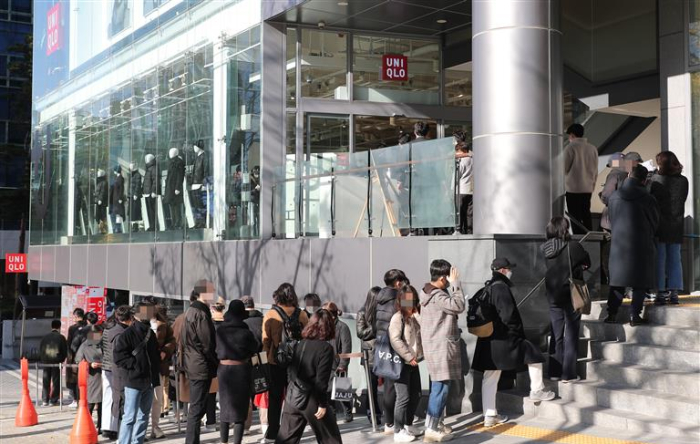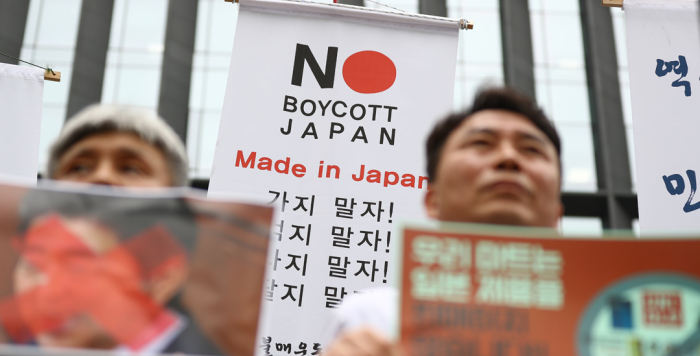Retail
End of No-Japanese boycott? Uniqlo Korea turns to black
Uniqlo and Lexus make comebacks in South Korea, while Japanese beer sales show no signs of recovery
By Dec 05, 2021 (Gmt+09:00)
3
Min read
Most Read
LG Chem to sell water filter business to Glenwood PE for $692 million


Kyobo Life poised to buy Japan’s SBI Group-owned savings bank


KT&G eyes overseas M&A after rejecting activist fund's offer


StockX in merger talks with Naver’s online reseller Kream


Mirae Asset to be named Korea Post’s core real estate fund operator



Japanese casual wear Uniqlo Co. swung to a hefty profit in South Korea in its fiscal year of 2021 from massive losses a year earlier
Lexus, the premium brand of Toyota Motor Corp., reclaimed the title of the bestselling imported car in the country last month for the first time in four years.
FRL Korea Co., an operator of Uniqlo, reported an operating profit of 52.9 billion won ($45 million) in the year ending Aug. 31, according to its regulatory filing on Dec. 2.
That compares with the previous year's 88.4 billion won operating loss reported by the 51:49 joint venture between Uniqlo's parent company Fast Retailing Co. and South Korea's Lotte Shopping Co. However, its sales declined to 582.4 billion won from 629.8 billion won over the same period.
The spread of COVID-19 dealt another blow to the Japanese fashion brand. Currently, it runs 145 stores nationwide, down 30% from 190 shops as of end-August, 2019. It shut stores on retail high streets in Seoul, including Myeong-dong and Gangnam.
Uniqlo, among the hardest hit by South Koreans' boycott against Japanese goods and travels, redrew the attention of Korean consumers with the rollout of new collaboration items with global designer brands.
Last month, the +J winter collection, launched in collaboration with German designer Jil Sander, triggered long lines in front of local Uniqlo stores before they opened. The shoppers rushed to buy down coats designed by Sander and offered at affordable prices.

This year, Uniqlo returned to expansionary mode, opening a new store in Busan, South Korea's second-largest city, for the first time in a year. It also re-opened a flagship store at another location in the southern port city.
Still, the operating profit at Uniqlo's South Korean unit in the fiscal year of 2021 is less than one-third of its 2019 results of 199.4 billion won.
LEXUS' REBOUND VS. POOR SALES OF JAPANESE BEER
Lexus staged a rebound in South Korea this year, selling 698 units of its flagship sedan ES300h last month, a month after it unveiled its redesigned model.
It was the first time for the Japanese carmaker to become the top-selling model in the country since July 2017, when it sold 660 units here. Until the first half of 2019, Lexus had sold 1,200-1,500 units per month in South Korea, which then tumbled to 400-800 units from the second half of 2019 with the start of the campaign against Japanese imports.
As the No-Japanese movement waned this year, Lexus regained popularity, selling a combined 8,994 units in the first 11 months to November of this year, slightly up from 8,911 units sold in the entire year of 2020.
Another Japanese carmaker Honda Motor Co. sold 4,055 units in South Korea during the same period, up from 3,056 cars sold in the whole year of 2020.
By contrast, Japanese beermakers saw no signs yet of recovery after their sales have plunged by more than 90% at the country's top three convenience stores CU, GS25 and 7-Eleven, since the boycott against Japanese imports began in 2019.
South Korea had long been one of the biggest markets for Japanese beer, which is being quickly replaced by a wide array of domestic craft beer and imported brands.
Write to Jeong-cheol Bae, Hyung-kyu Kim and Yoo-chung Roh at bjc@hankyung.com
Yeonhee Kim edited this article.
More to Read
-
 Business & PoliticsTrump Jr. meets Korean business chiefs in back-to-back sessions
Business & PoliticsTrump Jr. meets Korean business chiefs in back-to-back sessionsApr 30, 2025 (Gmt+09:00)
-
 Korean chipmakersSamsung in talks to supply customized HBM4 to Nvidia, Broadcom, Google
Korean chipmakersSamsung in talks to supply customized HBM4 to Nvidia, Broadcom, GoogleApr 30, 2025 (Gmt+09:00)
-
 EnergyLS Cable breaks ground on $681 mn underwater cable plant in Chesapeake
EnergyLS Cable breaks ground on $681 mn underwater cable plant in ChesapeakeApr 29, 2025 (Gmt+09:00)
-
 Business & PoliticsUS tariffs add risk premium to dollar assets: Maurice Obstfeld
Business & PoliticsUS tariffs add risk premium to dollar assets: Maurice ObstfeldApr 29, 2025 (Gmt+09:00)
-

Comment 0
LOG IN


